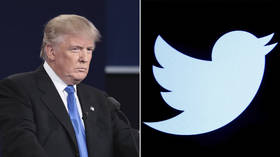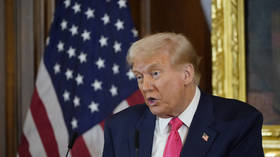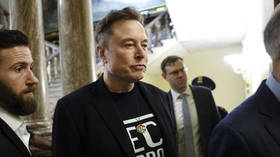‘War on free enterprise & expression’: Trump tears into social media firms for ‘abusing’ conservatives on behalf of ‘Radical Left’

US President Donald Trump and Attorney General William Barr have gone on the warpath against Big Tech, unveiling proposed reforms to the firms’ Section 230 liability that would curtail their ability to effect political censorship.
Singling out Twitter’s censorship of “conservative views,” the president warned the major tech platforms that the days of their exercising unrestrained political influence were numbered. He was speaking on Wednesday at a roundtable discussion with Attorney General William Barr, nine of his Republican state counterparts, and Senator Josh Hawley (R-Missouri), one of Congress’ most vocal critics of Big Tech.
President @realDonaldTrump on social media bias: At the urging of the Radical Left, these social media platforms have become intolerant of diverse political views pic.twitter.com/h5nc3pWaMW
— Team Trump (Text VOTE to 88022) (@TeamTrump) September 23, 2020
Big Tech has “used their power to engage in unscrupulous business practices while simultaneously waging war on free enterprise and free expression,” Trump told the assembled officials.
At the urging of the radical Left, these platforms have become intolerant of diverse political views and abusive toward their own users… as abusive as you could possibly be in some cases.
In case it wasn’t clear the president was referring to his own treatment by Twitter (and to a lesser extent Facebook), Trump singled the microblogging platform out for “routinely restrict[ing] posts expressing conservative views, even from a President of the United States” while supposedly allowing “vile antisemitic hate and even death threats” from Iranian Supreme Leader Ali Khamenei.
The proposed reforms would force tech companies to make their terms of service both clearly-defined and publicly available and prevent them from selectively enforcing them - i.e. using one rule for political enemies and another for allies. Platforms would be forbidden from using “deceptive or pretextual grounds” to block access to content and must notify users in a timely fashion if their content is restricted or removed. Users must be granted a “meaningful opportunity to respond” to any content removal, unless the offending material “relates to terrorism or other criminal activity” or would “risk imminent harm to others.”
The bill exempts from liability protection any company that “acted purposefully with the conscious object to promote, solicit, or facilitate material or activity” it knew would violate federal law. Platforms are also forbidden from blocking access to material hosted on another platform, unless they have “an objectively reasonable belief” that content is “obscene, lewd, lascivious, filthy, excessively violent, promoting terrorism or violent extremism, harassing, promoting self-harm, or unlawful.” Merely deeming content “objectionable,” however, is no longer protected under the liability shield.
Also on rt.com Search autocomplete rejigged by Google for political queries, as tech giants become the election meddlers they claim to fightTrump’s political opponents have unsurprisingly denounced the proposal. Ironically-named NGO Free Press said the anti-censorship provisions would “incentivize platforms to host content created by racists, sexists, propagandists, and trolls” and “open the door to those who want to drown the internet in an ocean of disinformation and toxicity,” denouncing the bill as “a naked attempt to silence anyone who attempts to correct or criticize Trump, his allies, and fellow travelers.” There is nothing in the text about banning criticism or fact-checking.
Section 230 protects social media platforms from being held liable for content posted by their users. It has been the subject of much debate in recent years as tech firms have become more overtly political. But while Trump signed an executive order in May threatening to strip away Section 230 protection from those tech firms that engaged in deceptive practices, most platforms have merely increased their censorship since then, citing the need to protect November’s election from the scourge of “disinformation” and “meddling” and guard against a coronavirus “infodemic.”
Facebook has all but threatened to go dark if the results are remotely close, while Twitter’s director of public policy quit last week to join the Biden transition team – just days after users observed their videos of Biden touching children inappropriately were being removed as “child sexual exploitation.”
Also on rt.com Twitter lets Democrat PAC push #TrumpIsAPedo after banning videos of Biden as ‘child exploitation’Think your friends would be interested? Share this story!













